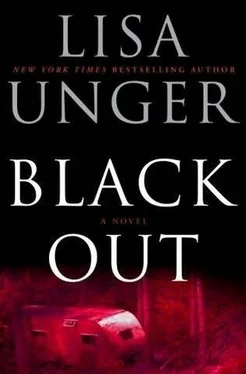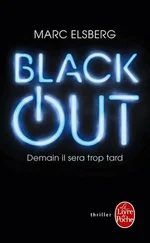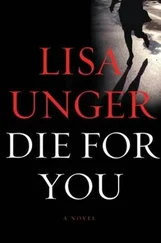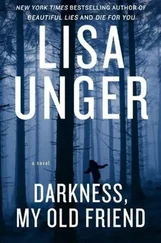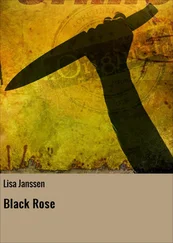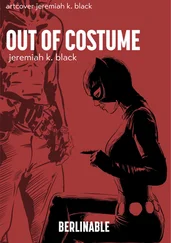“Nobody moved anything out of here in the last few hours?” I ask, trying not to sound as desperate and hysterical as I feel. I force my face into a mask of calm. I have learned in moments like this to keep the surface still even though the depths are raging. Animals hide fear and illness; they cannot afford weakness in the wild.
“No, no. Nothing like that tonight,” he says, handing me the paper. “This is the daytime building manager. He’d know better about all of this.”
Gray thanks him, and we leave. We walk in silence to the car, neither of us knowing what to say. We get inside and just sit for a minute. I examine the dashboard, since there’s nowhere else to rest my eyes. I can’t bring myself to look at Gray.
“I didn’t imagine the doctor-or what happened tonight,” I say.
“I know,” says Gray a little too quickly. I wonder if he’s humoring me. He puts a hand on my leg. When I find the strength to meet his eyes, I see his love for me, his compassion. This causes the tension in my shoulders to relax, my breathing to come easier.
“I saw her,” I say, remembering the moment and feeling a shudder move through my body. “I saw Ophelia.”
Worry is etched now in all the lines on his face. “You saw someone, ” he says. “In the terror of the moment, your mind played a trick on you.”
“I’ve seen her before, at a cocktail party and on the street. I just didn’t recognize her.”
He moves his hand from my leg to my arm and squeezes firmly. “What are you saying, Annie? You are Ophelia. She’s not a separate person from you.”
“I know that,” I snap. What am I saying?
“Then what are you telling me?”
I take in a deep breath. “Nothing. I don’t know.”
“There was no dust on the windowsill,” he says, changing the subject. He doesn’t want to talk about Ophelia. He wants to deal with the facts, with the empirical evidence, not ghosts and hallucinations. “If it had been sitting empty for weeks, there would be dust.”
“Really?” I say, feeling hope release some of the tightness in my chest. “What does that mean?”
“It could mean that something happened there tonight, and between then and now someone cleaned and took the furniture out.” Gray releases a long breath. Does he believe this, or is he just saying it to make me feel better? I don’t know, and I don’t ask.
Anyway, I do know what he’s thinking. He wishes I’d let him meet the doctor. But I never have. I’ve needed my present happy home life never to mingle with the nightmare of my past. But maybe that was part of my folly, to ever believe that I might separate the parts of myself like that, that I could keep the person I was from poisoning the person I am…especially when my present self is a fictional character I have created to escape my own heart, my own past, my own deeds.
You belong to me. But it’s not Marlowe’s voice I hear this time. It’s Ophelia’s.
They waited on the road rain or shine, blistering heat or lightning storms, with posters featuring pictures of their daughters, sisters, mothers, chanting, “Murderer. Murderer. Murderer.” They were careful to stay on the public road. For the most part, they were orderly and nonviolent. Even so, the police could have caused the group, which called itself the Families of Frank Geary’s Victims, to disperse-but they didn’t. There wasn’t much sympathy for Frank among the citizens or law enforcement in our new hometown.
I saw them when I left for school in the morning and usually when I came home. They seemed to work in shifts, the same ten or fifteen people taking turns on the road in front of our property. Twice I saw Janet Parker, appearing shrunken and even more haggard than she had when I first met her at our trailer. Her grief and pain were wasting her; she was slowly disappearing. Every time I saw her, I thought about her daughter floating in the water where Frank had left her.
There was one man, the father of one of Frank’s victims, who was so sick with rage that he looked like he’d stuck his finger in a socket every time he laid eyes on Frank. He’d go from this slack, tired-looking man to someone whose whole body was rigid and red with fury. He’d scream and hurl obscenities.
The morning after I’d watched Frank place the unidentified bundle in the trunk of his car, the Angry Man (as I’d come to think of him) tried to throw a rock at us before the others in his group stopped him. He collapsed, wailing, into the arms of a woman.
“These people need to move on,” my mother said that morning, annoyed by their grief and suffering. She was driving me to school, and Marlowe was along for the ride. “Frank’s not even in the car. Why would he be throwing rocks at us?”
“He wants revenge,” said Marlowe from the backseat. We locked eyes in the rearview mirror.
“He wants it from the wrong man,” said my mother. If she remembered her confession to me about Frank, about his strangeness, she showed no sign. I hadn’t even bothered to tell her what I saw the night before; she wouldn’t have believed me, and I didn’t want her to tell Frank. Fear was a stone I carried in my chest, so heavy I could barely stand upright. I thought of her in her used wedding dress, how she’d pranced about like Cinderella at the ball, thinking no one could see the frayed edges or the cigarette burn in the lace. The story of her life.
At school that day, I just sort of drifted from class to class, not participating, not hearing anything that was said to me. I had the feeling that I’d stepped out of normal life, that my circumstances so separated me from everyone around me that I could no longer communicate in this world. I wonder if this is when I started “dissociating,” as they say. Nothing seemed real to me, everything took on a kind of foggy quality. The change in me must have been apparent. People who had harassed and taunted me because of Frank were suddenly giving me a wide berth. My social-studies teacher asked me to stay after class and inquired about my home life. Is everything okay? I don’t know you that well, Ophelia, I admit, but you don’t seem like yourself. He’d placed a call to my mother, he told me, to tell her my grades were in a precipitous drop from my prior school records, but she hadn’t called back. The honors English teacher from your former school wrote to say what a talented writer you were, how remarkably well read you were for someone your age. We’ve seen no evidence of any of that here, Ophelia. How can we help? He seemed so sincerely worried that I didn’t have the heart to tell him no one at all cared about me or my grades.
That is another of those moments I reflect upon. This teacher was throwing me a lifeline, and if I had grabbed at it, maybe things wouldn’t have continued on their deadly trajectory. But I was too far gone by then, too alienated from the world around me to know a way out when I saw it.
As I stepped off the school bus that afternoon, I crossed the street to avoid the protesters. To their credit, they generally left me alone. They must have recognized me as the victim I was, as helplessly cast in this miserable production as they were. They threw alternately pitying and suspicious looks in my direction as I came and went each school day. That day I saw Janet Parker watching me. She held a cup of coffee, raised it slowly to her lips. I glanced away from her, and as I did, I noticed Marlowe standing beside her. It looked like he was whispering something in her ear. I turned away quickly, cast my eyes to the ground, and walked through the gate to make the long trek to our house.
Gray Powers is not a man who is often wrong. With a name like that, it seems almost impossible that he could ever be mistaken about anything. He should be jumping into telephone booths, slipping into superhero garb, and saving the day-which is actually not that far from what he does. But he was wrong about Detective Ray Harrison. Gray had sized him up as a small-town cop, corrupt and not that bright, looking for a big payday. He’s the one who always says that the worst mistake you can make in a fight is to underestimate your opponent. And it’s true.
Читать дальше
